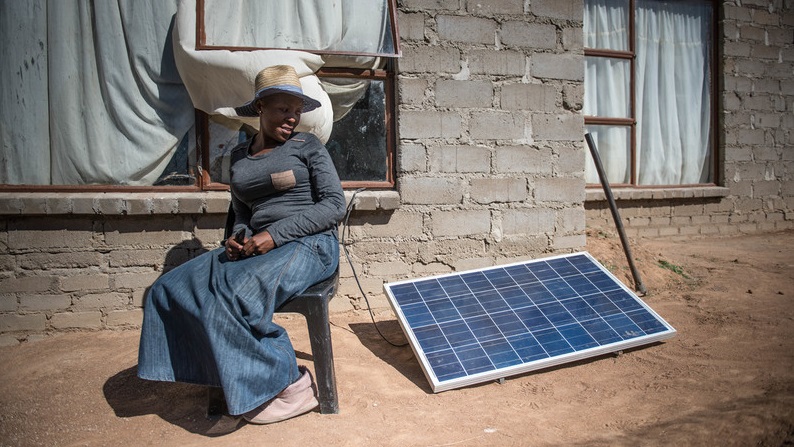The European Union’s push to set a global target for rolling out renewable energy gained some support at a meeting of 40 global climate officials in Berlin this week.
The United Arab Emirates climate envoy Sultan Al-Jaber told the Petersberg climate dialogue that he backed the EU’s call for the world to set a target to triple renewable energy capacity by 2030. The UAE will host the Cop28 climate talks in November.
Other supporters of that commitment include the US, Chile, Colombia and representatives of small island states. The proposal has not met significant opposition.
EU makes case
The head of the European Union’s Commission, Ursula Von der Leyen, first suggested global renewable and energy efficiency targets in a speech to a US-hosted climate summit two weeks ago.
In Berlin this week, the EU’s climate lead Frans Timmermans repeated the call. He said that renewables growth was “a success that nobody expected at this scale”.
Germany promises €2bn to global Green Climate Fund
“Look at what China is doing in the road to renewables ,” he told the group of climate ministers which included a Chinese representative. “It is amazing, it is inspiring, it really is mind-boggling sometimes, to see the scale at which this is happening”.
“Should this not be something that we should take to the global level and try to agree on global goals to achieve this: removing, decarbonising our energy system?” he asked.
Cop hosts support
In their speeches to mark the opening of the Berlin talks this week, Germany’s foreign minister Annalena Baerbock and the UAE’s Al-Jaber both said renewables should be tripled by 2030.
Ahead of #COP28, representatives of 40+ countries discussed at the #Petersberg Climate Dialogue how to accelerate the energy transition & keep 1.5 alive. A firm target for #renewable expansion would be a strong signal. Find the co-chairs’ summary here: 👉 https://t.co/jUrfWQf7l5
— GermanForeignOffice (@GermanyDiplo) May 5, 2023
Al-Jaber, who will shape the agenda of Cop28, said that, after reaching that initial goal, renewables should double again by 2040.
An official summary of the talks did not mention opposition to the target. But some unnamed governments criticised renewables at the meeting, claiming “fossil fuels currently are the most affordable form of energy, particularly in developing countries, given the high up-front costs of renewables deployment”.
Cop28 boss slams rich nations “dismal” $100bn finance failure
The International Energy Agency (IEA) has found that as renewable energy costs have fallen, they are now “competitive” with fossil fuels in many countries. Utility-scale solar and onshore wind are the cheapest options for new electricity generation in a significant majority of countries worldwide, the IEA said.
Step up in ambition
The details of the target are still being worked out but tripling capacity by 2030 will mean significantly raising the current level of ambition on the global renewables roll-out.
The International Energy Agency predicts that current governments’ policies will less than double the world’s renewables capacity on 2021 levels by 2030.
But analysts at Ember think the world needs even more renewables than the IEA claims. A spokesperson said the IEA’s figures “likely downplay the scale of wind and solar required by overestimating the success of other measures (nuclear, carbon capture and storage, energy efficiency) and underestimating the pace of growth in solar manufacturing”.
Based on research
The tripling target is based on work carried out by the International Energy Agency (IEA) and the International Renewable Energy Agency (Irena).
The IEA has said that the world currently has about 3,300 GW of renewable energy capacity and, in order to be in with a shot of limiting global warming to 1.5C, about 1,000 GW should be added every year to 2030, roughly tripling the total amount to 10,350 GW.
These findings were echoed in a statement released by the UAE-based International Renewable Energy Agency in March and the IEA’s head Fatih Birol presented a paper highlighting it at the US-hosted Major Economies Forum on climate last month.
Pressure builds on Council of Europe to put right to healthy environment in law
Details of the renewables target have yet to be finalised. But it could be set in terms of an outright volume of new renewable capacity or as a percentage of renewables in total new electricity sources installed.
On energy efficiency, the IEA says that energy intensity should fall 4% a year every year until 2030 to help limit global warming to 1.5C.
As energy intensity fell by 1.3% in the second half of the 2010s, the world needs to roughly triple the effectiveness of its energy efficiency measures like the insulation of buildings and incentives for less energy-guzzling household appliances.
Fossil phase-out
While the renewables target did not meet significant opposition, a proposal to phase out fossil fuels is much more controversial. It was rejected at the last Cop climate talks in Egypt after opposition from Saudi Arabia, Russia and Iran.
Chile’s environment minister Maisa Rojas told journalists during this week’s Berlin talks that renewable and energy efficiency targets have to go “hand in hand” with the phase-out of fossil fuels.
She said: “This has to go together because otherwise we will just be adding new energy right? We really have to make sure that if we add new energy, we’re also taking the dirty energy out of the system”.
The UAE’s Al-Jaber said this week that only “fossil fuel emissions” not fossil fuels should be phased out, wording which allows fossil fuel use to continue if the emissions are taken in by carbon capture technology.
